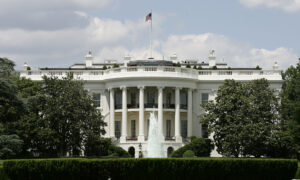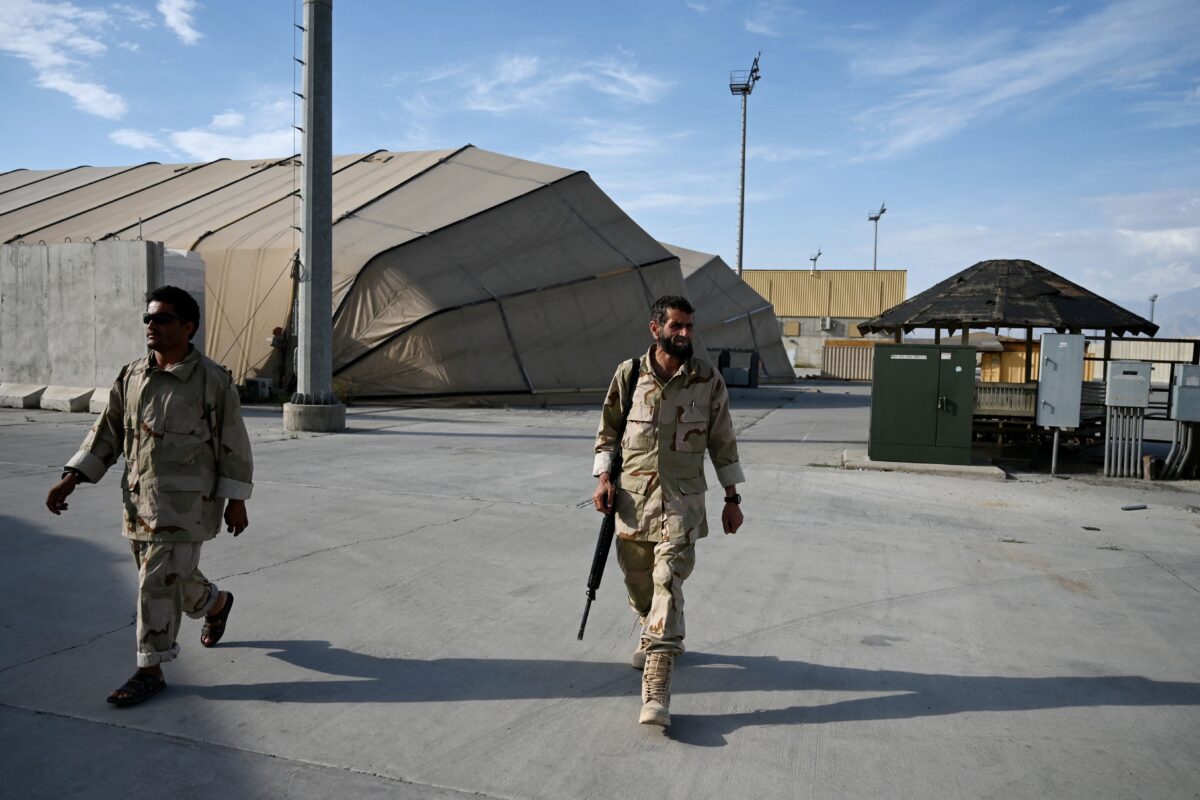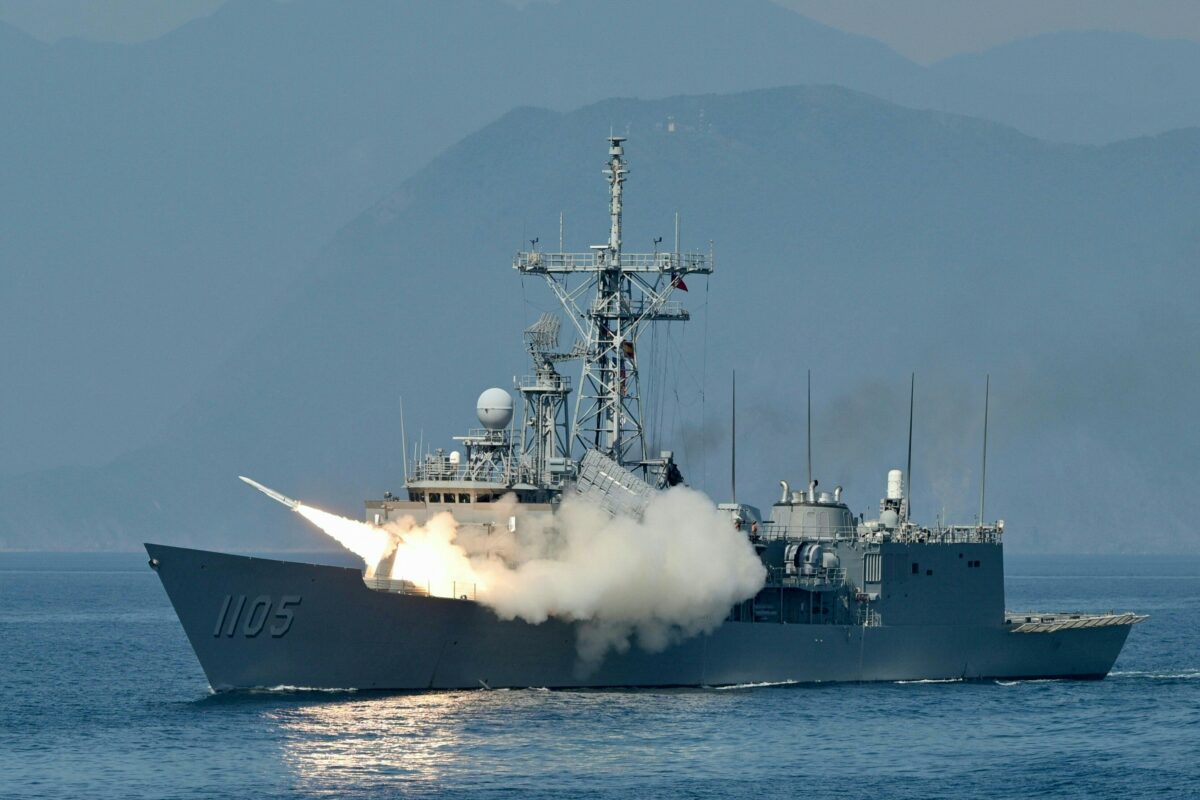Biden’s National Security Strategy Relinquishes US Leadership
It acknowledges China and Russia as top threats, but still exposes America’s backCommentary The Biden administration’s new “National Security Strategy,” released on Oct. 12, is dangerously wrongheaded. Sure, the 48-page document identifies China and Russia as America’s biggest threats. That’s not hard to realize, as both countries use stolen American technology to build hypersonic nuclear missiles pointed at Washington, D.C. But it repeatedly reveals defeatism and weakness in relinquishing American military and economic leadership in the international system, a leadership that undergirded the international rule of law since the end of World War II, and that is critical to defeating the threats from not only Beijing and Moscow, but from terrorism. This is most obvious in the strategy’s approach to the latter, when it states, “Around the world, we will increase cooperation and support to trusted partners, shifting from a strategy that is ‘U.S.-led, partner-enabled’ to one that is ‘partner-led, U.S.-enabled.’” That shows a strategic timidity on the part of the Democrats, which is exactly the wrong approach. President Joe Biden thus disarms the United States against terrorists by normalizing the use of force by foreign auxiliaries rather than our own soldiers. This strategy often backfires, as it did by reliance on Pakistan as an intermediary in the fight against the Soviets in Afghanistan during the 1980s. It is generalized by the administration in a manner that can apply to countries like Russia, China, Iran, and North Korea. “We have too often defaulted to military-centric policies underpinned by an unrealistic faith in force and regime change to deliver sustainable outcomes while failing to adequately account for opportunity costs to competing global priorities or unintended consequences,” the strategy states. That downplays the U.S. military option against state sponsors of terrorism and, therefore, removes an important element of deterrence. If terror states think the American reaction will always be a surgical strike against terrorists, or free money to buy support, and never regime change against the dictators who support terrorists, then we continue a reactive strategy of whack-a-mole and costly largesse, while never defeating the root causes of terrorist financing. This retreat from American intervention abroad is militarily and economically misguided, and consistent with Biden’s humiliating failure in Afghanistan, a geographic pressure point that would have been useful against not only terrorists, but against Beijing. Afghan National Army (ANA) soldiers walk inside the Bagram U.S. air base after all U.S. and NATO troops left, some 43 miles north of Kabul on July 5, 2021. (Wakil Kohsar/AFP via Getty Images) Afghanistan’s loss is now a sign of weakness to state-backers of terrorism, including dictators in Russia and Iran, who can sleep easier knowing that U.S. marines, at least during the Biden administration, will not come knocking at their doors. This relinquishment of American military leadership is a major theme in the strategy, which explicitly states that “countries must be free to determine their own foreign policy choices.” Biden gladhands everyone with international liberalism that even applies to those cooperating with Beijing and Moscow. But no country should be “free” to support the world’s worst dictators. The “freedom” to support them is not freedom but treachery against democracy. Examples are India’s decision to continue buying oil from Russia despite Ukraine sanctions, Ukraine’s decision to abstain from a U.N. vote to debate China’s genocide against the Uyghurs, and the Solomon Islands’ agreement for Chinese military access to port facilities. The Biden administration’s promotion of their freedom to make bad choices, rather than consistently imposing consequences in the form of secondary sanctions, is a squandering of America’s economic leadership. Our economic power to do good, including the power to restrict market access to the U.S. economy, will only decrease over time as the rest of the world adopts our technologies. Even in the United States, some support dictatorships. In 2021, U.S. companies did over $650 billion in trade with China. They invested another $2.3 trillion into the country over the years. That should end now, but the strategy document does not mention this empowering of America’s greatest adversary. We need to end American hypocrisy and recognize that investment in dictatorships only empowers them. We need to decouple with China on principle, so we can unhypocritically insist that others do as well. Decoupling requires coordination and leadership by the United States and G-7 allies, as no others come close to the necessary economic power to leverage the world into foregoing trade with China. Countries must be told, in no uncertain terms, that they are not free to trade with the enemy. If they do so, they lose access to G-7 markets. The Biden stra

It acknowledges China and Russia as top threats, but still exposes America’s back
Commentary
The Biden administration’s new “National Security Strategy,” released on Oct. 12, is dangerously wrongheaded. Sure, the 48-page document identifies China and Russia as America’s biggest threats. That’s not hard to realize, as both countries use stolen American technology to build hypersonic nuclear missiles pointed at Washington, D.C.
But it repeatedly reveals defeatism and weakness in relinquishing American military and economic leadership in the international system, a leadership that undergirded the international rule of law since the end of World War II, and that is critical to defeating the threats from not only Beijing and Moscow, but from terrorism.
This is most obvious in the strategy’s approach to the latter, when it states, “Around the world, we will increase cooperation and support to trusted partners, shifting from a strategy that is ‘U.S.-led, partner-enabled’ to one that is ‘partner-led, U.S.-enabled.’”
That shows a strategic timidity on the part of the Democrats, which is exactly the wrong approach.
President Joe Biden thus disarms the United States against terrorists by normalizing the use of force by foreign auxiliaries rather than our own soldiers. This strategy often backfires, as it did by reliance on Pakistan as an intermediary in the fight against the Soviets in Afghanistan during the 1980s. It is generalized by the administration in a manner that can apply to countries like Russia, China, Iran, and North Korea.
“We have too often defaulted to military-centric policies underpinned by an unrealistic faith in force and regime change to deliver sustainable outcomes while failing to adequately account for opportunity costs to competing global priorities or unintended consequences,” the strategy states.
That downplays the U.S. military option against state sponsors of terrorism and, therefore, removes an important element of deterrence. If terror states think the American reaction will always be a surgical strike against terrorists, or free money to buy support, and never regime change against the dictators who support terrorists, then we continue a reactive strategy of whack-a-mole and costly largesse, while never defeating the root causes of terrorist financing.
This retreat from American intervention abroad is militarily and economically misguided, and consistent with Biden’s humiliating failure in Afghanistan, a geographic pressure point that would have been useful against not only terrorists, but against Beijing.

Afghanistan’s loss is now a sign of weakness to state-backers of terrorism, including dictators in Russia and Iran, who can sleep easier knowing that U.S. marines, at least during the Biden administration, will not come knocking at their doors.
This relinquishment of American military leadership is a major theme in the strategy, which explicitly states that “countries must be free to determine their own foreign policy choices.” Biden gladhands everyone with international liberalism that even applies to those cooperating with Beijing and Moscow.
But no country should be “free” to support the world’s worst dictators. The “freedom” to support them is not freedom but treachery against democracy.
Examples are India’s decision to continue buying oil from Russia despite Ukraine sanctions, Ukraine’s decision to abstain from a U.N. vote to debate China’s genocide against the Uyghurs, and the Solomon Islands’ agreement for Chinese military access to port facilities.
The Biden administration’s promotion of their freedom to make bad choices, rather than consistently imposing consequences in the form of secondary sanctions, is a squandering of America’s economic leadership. Our economic power to do good, including the power to restrict market access to the U.S. economy, will only decrease over time as the rest of the world adopts our technologies.
Even in the United States, some support dictatorships. In 2021, U.S. companies did over $650 billion in trade with China. They invested another $2.3 trillion into the country over the years. That should end now, but the strategy document does not mention this empowering of America’s greatest adversary.
We need to end American hypocrisy and recognize that investment in dictatorships only empowers them. We need to decouple with China on principle, so we can unhypocritically insist that others do as well.
Decoupling requires coordination and leadership by the United States and G-7 allies, as no others come close to the necessary economic power to leverage the world into foregoing trade with China.
Countries must be told, in no uncertain terms, that they are not free to trade with the enemy. If they do so, they lose access to G-7 markets. The Biden strategy goes in the opposite direction.
Failing to Call CCP the Enemy
Biden’s national security strategy fails in the simplest task of calling the Chinese Communist Party (CCP) what it is: an adversary of America and an enemy of democracy. Instead, the administration persists in calling China a “competitor,” as in a game where each side plays fair and may the best side win.
Beijing is busy building weapons for the takeover of Taiwan, which could pull the United States into an existential war. China steals up to $600 billion worth of intellectual property annually from the United States, which has empowered the country’s military technology and economic growth. It claimed the entire South China Sea, which our allies depend upon, as its sole territory.
Beijing is not playing by the rules. Instead, it is stabbing us and our friends in the back. If the administration cannot even call Beijing an “adversary,” much less an enemy, it is being catastrophically dishonest with the American people and the world.
Failing to Acknowledge Taiwan’s Independence
The administration is right to stress that the Chinese people are not an enemy, as the Trump administration did previously. But it is wrong to kowtow to Beijing by downplaying its threat, which is only increased by Biden’s opposition to Taiwan independence, explicitly stated in his strategy.
Taiwan is the world’s only majority-Chinese democracy and the greatest hope for eventually democratizing China itself. We continue to expose an independent, proud, and sovereign Taiwan to the wolves in Beijing at our own peril.

While China is still too weak to invade Taiwan, the Chinese military is getting stronger with our technological and scientific help. Washington and its allies must cut China off from American scientific resources and explicitly support Taiwan’s independence. With independence, we can more effectively defend the country militarily and diplomatically, including through U.S. bases on Taiwan’s soil and delivery of the weapons systems needed to deter China’s aggression.
Attacking Potential Allies While Claiming to Do the Opposite
Biden’s national security strategy frames the next decades as a “competition between democracies and autocracies.” This needlessly alienates some autocracies that could be our allies against our most dangerous foe: China. In this, the administration shows a profound lack of strategy and sequencing.
Saudi Arabia was a long-time U.S. ally until Biden singled it out. He had to humiliate Washington by crawling back to Riyadh this year, in the context of rising inflation led by oil prices, and beg for more supply. The Saudis are still not cooperating.
Vietnam could be an ally, given its proximity to China and Beijing’s use of force to try and steal its maritime resources, including fish, oil, and transport routes through the South China Sea. But by targeting all autocracies, the Biden administration pushes Vietnam toward Beijing’s camp.
Even Russia could be an ally against China if we got rid of some of the overbroad and polarizing language that the Biden administration tends to headline. Of course, we should empower Ukraine to defeat Russian aggression, including by retaking Crimea. The weapons we give them are insufficient and should be increased in power and range so Kyiv can hold Moscow hostage, just as Moscow does to Kyiv. That strategy of peace through strength would end the war quickly but is nowhere mentioned in the Biden document.
The United States should try harder to turn Russia into an ally. We should make the point publicly, to the Russian people, that Russia’s unpopulated east is at risk of a Chinese takeover, especially after Russian President Vladimir Putin stripped it of defenses to concentrate military force against Ukraine.
Selling False Hope of Cooperation With China
Biden’s strategy tells us there are many areas of cooperation still to be achieved with Chinese leader Xi Jinping, for example, on pandemics, global warming, nonproliferation, terrorism, illegal narcotics (fentanyl), and inflation. This provides cover to our special interests that do hundreds of billions of dollars of business with China every year.
But we have tried and failed to cooperate with Beijing on these issues. Pretending that Beijing could still cooperate, rather than use them as deadly levers against us, is disingenuous and a lie to the American people.
In the final analysis, Biden’s strategy is a dishonest relinquishment of American economic leadership and a military retreat from the world stage that leaves the world more vulnerable to Moscow and Beijing’s tactics of incrementalism, and the United States vulnerable to its most dangerous enemy.
We need a focused strategy against the CCP that uses peace through strength to coordinate our allies as a single force geared to win, and that induces smaller autocracies to support the fight. While Biden’s national security strategy is mostly filled with obvious truisms, it fails on these most critical points.
Views expressed in this article are the opinions of the author and do not necessarily reflect the views of The Epoch Times.












